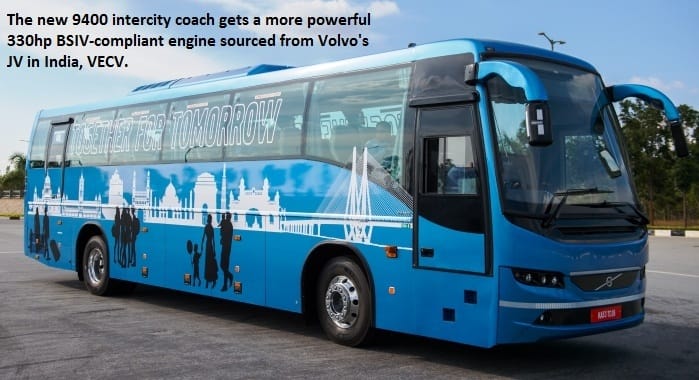'If electro-mobility gains traction in India, we have the hybrid bus and we will look to bring our electric bus at the appropriate time.'
Volvo Buses is looking to penetrate the premium bus market in India with its new 9400 intercity coach range. VRV Sriprasad, the company’s MD for South Asia reveals the future plans and BS IV strategy.
Volvo Buses is looking to penetrate the premium bus market in India with its new 9400 intercity coach range. VRV Sriprasad, the company’s MD for South Asia reveals the future plans and BS IV strategy. An interview by Kiran Bajad.
Volvo Buses has completed 15 years in India and has almost 6,000 buses plying here. What is the future growth plan?
In terms of capacity, we are already invested with a total of 1,500 units per annum. In terms of technology, with a five-year horizon, the next big emission regulations — Euro 6 or BS VI — come in 2020. Until then, we already have a product which we have launched. We don't have to work for BS VI since we already have it in our portfolio, both in engines and technology. In fact, our joint venture partner (VE Commercial Vehicles) already manufactures Euro 6 engines in India and exports to Europe. Come 2020, we just have to pick it up and that will also be localised for us.
We are ready with products for the next five years. If electro-mobility gains traction in India, we have the hybrid bus and we will look to bring our electric bus at the appropriate time. From the supply side, we are ready. As regards demand, we are waiting for the high-end bus market to pick up as it is still at a very nascent stage and not yet matured.
Having spent 15 years in India, we understand this market and how development happens. We know the customer psyche, operating economics, challenges on the road and what is the appropriate technology for India. We have had huge learnings.
In the future, if there is demand for technology change, we are far better placed than anybody in the market with knowledge, a huge customer base and would leverage whatever the demand unfolds in India.
What, in your opinion, is the size of the premium bus market in India?
Though we don’t give numbers specific to our company, the size of the premium bus market is just two percent of the total bus market. In the past few years, the market has been really challenging and has stagnated. In the premium bus market, it was almost 50:50 with coaches and city buses.
In the past six years, this 50 percent of city buses has come largely from the JNuRMM scheme which is now closed. There is no alternate for 50 percent volumes which were happening and the city bus market has almost shut down. However, the coach market is growing as the middle-class is travelling and is likely to steady. There are enough opportunities for the coach market to grow.

What are the key essentials to achieve success in the Indian commercial vehicle market?
For any highway vehicle, be it a truck or a bus, two things are very important. You need to have regular service and be as close to the customer as possible. But this is a moving target as more and more new customers come in and shift their depots to newer places, which means we have to keep pace with them.
Secondly, in the unlikely event of a breakdown, we should able to reach the vehicle as fast as possible. That is something we have planned well and customers are comfortable in the way we respond and get the vehicle back on road quickly.
With mandatory BS IV from April 2017, commercial vehicle prices will rise. Will there be an impact on demand?
There is a cost to upgrade vehicles to BS IV. For instance, there is the Ad-Blue tank and re-packing of the engine site, so there will definitely be a cost to all the manufacturers.
While we are bringing in BS IV, we worked on a lot of additional value delivery in terms of improved fuel efficiency, performance and maintenance cost. It’s our way of telling the customer that although he has to pay a premium for complying with BS IV, we are protecting overall operating economics and he will be able to recover the premium because of better fuel economy and lesser maintenance cost.
What is the status of Volvo's plan to export made-in-India buses to Europe?
I won’t be able to give you the exact number but we had a launch in Spain, France. The first physical prototype was exported in June 2015 and the commercial launch was held in October 2016. We are also looking at customers in Nordic countries for exports from India.
RELATED ARTICLES
INTERVIEW: "EV Demand is Rebounding both in India and Around the Globe" - JLR's Rajan Amba
Jaguar Land Rover India MD Rajan Amba discusses the India–UK FTA, the company’s manufacturing plans, the upcoming Panapa...
TVS Celebrates 20 Years of Apache, Eyes Premium and Global Push
Marking two decades of its flagship performance brand, TVS Motor unveiled special anniversary editions on Saturday while...
Q&A: Mahindra's Nalinikanth Gollagunta on Upcoming Festive Season, 'Bold' Design Choices
Automotive Division CEO Nalinikanth Gollagunta says mid-teens growth is achievable with Roxx ramp-up, BEVs, and a resil...






 By Kiran Bajad
By Kiran Bajad
 03 Jan 2017
03 Jan 2017
 15472 Views
15472 Views







 Darshan Nakhwa
Darshan Nakhwa


